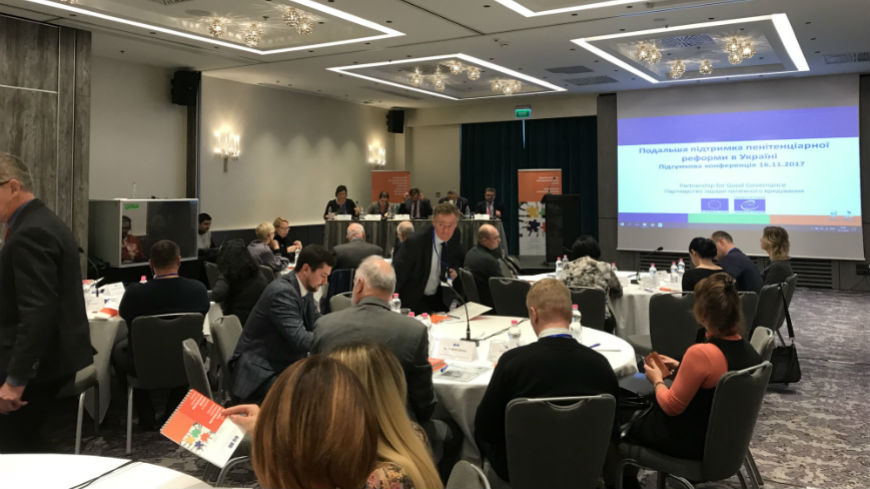The project stocktaking conference was held in Kyiv on 16 November 2017 to inform all stakeholders about the progress made since 2015 and to share the plans for 2018. The members of the Project Co-ordination Committee - Mr Iurii Miroshnychenko, MP, and the Deputy Minister of Justice, Mr Denys Chernyshov - emphasised in their opening remarks the positive role the project had played in assisting Ukrainian decision- and policy-makers with the implementation of penitentiary reform.
With over 100 activities since its launch in July 2015, the project helped the legislators with a number of legal amendments humanising the execution of criminal sanctions and participated in the Working Group on the Draft Law on the Penitentiary System, presently registered in the Parliament as #7337.
On the project initiative, the Code of Ethics for Prison Staff was revised and then approved by the Minister of Justice. A new edition of the Prison Management Manual, with 8000 copies printed, promotes European standards and best practices in managing prisons and contemporary concepts of dynamic security and pro-social modelling. While dynamic security implies establishing positive, professional relationship between staff and inmates, pro-social modelling is about prison staff actively helping prisoners to learn new positive behaviours. Providing a full range of constructive activities for prisoners plays an important part in the “dynamic security” of the prison. This means that, if prisoners are fully and productively engaged in constructive activities, the prison is likely to be safer and more secure. A Catalogue of Social and Life-Skill Courses had been produced and successfully tested in 6 pilot prisons. These courses are meant to assist and positively affect the rehabilitation process of inmates and their return to safe society.
One of the highlights of the conference was a presentation of the NGO Expert Centre for Human Rights of the survey “Prison through the Eyes of Prisoners” reflecting the opinions of 105 inmates from five penal institutions in Ukraine. At the top of the prisoners’ concerns were the issues of poor healthcare and a lack of trust in prisons, both in prisoner-personnel and prisoner inter-relationships.
The Bila Tserkva In-Service Training Centre Director, Oleg Duka, provided his feedback on how the project’s emphasis on rehabilitation approaches in criminal sanctions had fostered the changes in their curriculum. The juvenile prisons in Kremenchuk and Pryluky were proud to present results of effective piloting of the action-oriented suicide prevention guidelines and the personal inspectors’ schemes. Both pilots agreed that the introduction of personal inspectors, who become the first point of contact for communication and motivation of a young prisoner, plays an important role in strengthening security situations and a generally positive atmosphere in prisons.
To sum up, the main project partners pointed out that a very important shift of the paradigms – from punitive to rehabilitative approach – is currently on in Ukrainian penitentiary system.
The activity was organised within the framework of the Project on “Further Support to Penitentiary Reform in Ukraine”, financed under the European Union and the Council of Europe Partnership for Good Governance.

